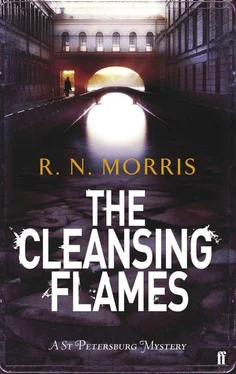R. Morris - The Cleansing Flames
Здесь есть возможность читать онлайн «R. Morris - The Cleansing Flames» весь текст электронной книги совершенно бесплатно (целиком полную версию без сокращений). В некоторых случаях можно слушать аудио, скачать через торрент в формате fb2 и присутствует краткое содержание. Год выпуска: 2011, ISBN: 2011, Издательство: Faber and Faber Fiction, Жанр: Исторический детектив, на английском языке. Описание произведения, (предисловие) а так же отзывы посетителей доступны на портале библиотеки ЛибКат.
- Название:The Cleansing Flames
- Автор:
- Издательство:Faber and Faber Fiction
- Жанр:
- Год:2011
- ISBN:0571259154
- Рейтинг книги:5 / 5. Голосов: 1
-
Избранное:Добавить в избранное
- Отзывы:
-
Ваша оценка:
- 100
- 1
- 2
- 3
- 4
- 5
The Cleansing Flames: краткое содержание, описание и аннотация
Предлагаем к чтению аннотацию, описание, краткое содержание или предисловие (зависит от того, что написал сам автор книги «The Cleansing Flames»). Если вы не нашли необходимую информацию о книге — напишите в комментариях, мы постараемся отыскать её.
The Cleansing Flames — читать онлайн бесплатно полную книгу (весь текст) целиком
Ниже представлен текст книги, разбитый по страницам. Система сохранения места последней прочитанной страницы, позволяет с удобством читать онлайн бесплатно книгу «The Cleansing Flames», без необходимости каждый раз заново искать на чём Вы остановились. Поставьте закладку, и сможете в любой момент перейти на страницу, на которой закончили чтение.
Интервал:
Закладка:
‘That seems rather inflexible. Does it not curtail your commercial potential?’
‘It is simply the kind of work we are set up for. We have stop cylinder platen machines which we use for book and periodical production. We used to have a treadle-powered letterpress, which was ideal for the sort of jobs you describe. But it was stolen.’
‘A printing press was stolen? Good Heavens.’
‘It’s not unheard of. It was a small machine, not like these beasts.’
‘Who would have stolen it?’
‘Well, you know. . There are those who find it rather useful to have an illegal printing press, if you know what I mean.’
‘It is a pity that you cannot help us. We had been led to believe that you could.’
‘Really? By whom, may I ask?’
‘Mr Pseldonimov.’
The foreman gave a snort of incredulity. ‘Pseldonimov? I sincerely doubt it. Pseldonimov is not the type to have friendly dealings with the Department of Justice!’
‘What do you mean by that, if I may ask?’
‘Why, he is the one I suspect of stealing my press!’
‘I see. And why is that?’
‘For one thing, he disappeared soon after the press was stolen. I was dropping hints about it and things got too hot for him, so he scarpered. Good riddance, I say.’
‘When was this?’
‘Oh, it must have been six months ago. More. Last autumn, I believe it was.’
‘How interesting. Did you report the theft of your press to the authorities?’
‘Oh yes.’
‘And your suspicions regarding Pseldonimov?’
The foreman gave a shrug. ‘I couldn’t prove anything. What was the point?’ But his head was angled down, his eyes averted away from his interlocutor, evasively, or so it seemed to Virginsky.
‘Perhaps you knew that he would meet his comeuppance anyhow,’ said Virginsky.
The foreman gave him a startled look, as if he were astonished to discover that he could speak.
‘Pseldonimov is dead, you know,’ continued Virginsky. ‘It might be said that you had a motive to kill him — or to organise his death.’
‘I don’t know anything about that. Look here, what is all this about? I thought you wanted to purchase some print work.’
Porfiry gave Virginsky a disparaging look. ‘We do. That is to say, we did. But now we know that you are not able to help us. Unless, of course, you are intending to replace the stolen printing press?’
‘I would love to, of course, but at the moment I don’t have the capital. Our profit margins are very tight.’
‘But with the promise of ongoing work from the Department of Justice, perhaps you could persuade the bank to supply a loan.’
‘That’s possible, I suppose.’
‘Perhaps then, you would allow us to have a look around? Just to reassure ourselves that your facilities are up to the task. There are certain minimum standards that every government department requires.’
‘Be my guest, though there isn’t much for you to see. I don’t have the press that I would use to do your work, as that depends on me getting the contract.’
‘Understood,’ said Porfiry, blinking suavely.
Virginsky frowned, as much to himself as for Porfiry’s benefit. He was not entirely sure what they were looking for. It was so long since Pseldonimov had been at the workshop that he doubted they would find any meaningful evidence relating to him. And as for assessing the print shop’s suitability as a supplier for the Ministry of Justice, he was hardly qualified to make a judgement on that.
None of this seemed to concern Porfiry, who gave every impression of being in his element. He wandered over to the nearest printing press and looked down at the growing pile of printed sheets, each bearing four pages of type, ready for folding and cutting into quartos. He gave a startled blink as each sheet jumped out from the jaws of the press. He soon appeared to be mesmerised by the action of the machine.
He turned to the foreman with a look of wonder. ‘What is this?’
‘We are printing a lubok .’
‘A lubok ! How fascinating. Perhaps you know a gentleman called Rakitin. He is an author of lubki . Perhaps you have printed some of his work?’
‘We do not generally have dealings with authors.’
‘But he was a friend of Mr Pseldonimov’s, I believe.’
The foreman shrugged, as if this information was not of the least interest to him.
Porfiry gave a small bow to indicate that he had seen enough.
*
‘What now, Porfiry Petrovich?’ A small, blindingly white rupture in the clouds above Voznesensky Prospect drew Virginsky’s gaze. The rain had dried up. The air was clearing.
Porfiry took out a folded piece of paper and handed it over. ‘Pseldonimov’s last known address,’ he explained. ‘It came in after the file had gone off to the Third Section.’
‘Obvodni Canal Embankment, 157. You think we should go there?’
‘It’s not far. Just across the Fontanka and down Izmailovsky Prospect.’
‘Yes, but we are not supposed to be investigating this case any longer. What possible reason could we have for going to Pseldonimov’s lodgings?’
‘A citizen has only just now reported the theft of a valuable piece of equipment. Do you not think he would be grateful if we were able to recover it?’
Virginsky shook his head in begrudging admiration, his mouth cranked into an involuntary grin.
*
Number 157 was only one door away from a dosshouse, on the northern embankment of the Obvodni Canal. Facing the building, on the other side of the canal, was the Varshavsky Railway Station, and next to that the Cattle Yards. This was at the southern threshold of the city. There was a bleak, fragmented feel to the area, as if it barely cohered as a neighbourhood. It seemed an appropriate location for a night shelter for transients; equally fitting that the former lodgings of a murder victim should be next door.
They discovered that Pseldonimov had shared an apartment with six other men. That was nothing unusual for the Narvskaya District, of course, one of the poorest in the city. The yardkeeper who admitted them was a wily individual with cheeks so ruddy they seemed to be painted on and eyes that were little more than chisel slits in the hardened fabric of his face. The impression was superficially cheery, but if you looked into those permanently narrowed eyes, you saw reflected back at you an empty, instinctual cunning and a dark-hearted contempt. Pseldonimov’s vacated bunk had long ago been filled, of course, and the yardkeeper pretended to know nothing of any possessions that had been left.
A man with a liverish complexion lay on a plank bed, covered by a coarse blanket. He was either drunk or dying, and at that time of the day, the latter was more probable. He raised himself with difficulty onto one elbow and pointed a trembling finger at the yardkeeper. In a voice that was astonishingly clear and robust, he said, ‘He stole it all.’ He fell back on his plank and closed his eyes. He lay very still now, and it almost seemed as though this surge of effort had hastened his end.
‘He’s delirious,’ said the yardkeeper.
‘Of course,’ agreed Porfiry. ‘But still, it is a serious charge. For a yardkeeper, who holds a position of trust and responsibility, to be accused of such a crime. . it must be investigated. You will have to come with us back to the police bureau. Unless, of course, it is all a misunderstanding? Perhaps you were simply looking after Mr Pseldonimov’s possessions until his relatives came to claim them? If that were the case, there would be no need for any investigation. It would be enough for you simply to show us the items and we could arrange for them to be collected and passed on to the parties concerned. I am sure there might even be a reward, if everything is found to be intact.’
Читать дальшеИнтервал:
Закладка:
Похожие книги на «The Cleansing Flames»
Представляем Вашему вниманию похожие книги на «The Cleansing Flames» списком для выбора. Мы отобрали схожую по названию и смыслу литературу в надежде предоставить читателям больше вариантов отыскать новые, интересные, ещё непрочитанные произведения.
Обсуждение, отзывы о книге «The Cleansing Flames» и просто собственные мнения читателей. Оставьте ваши комментарии, напишите, что Вы думаете о произведении, его смысле или главных героях. Укажите что конкретно понравилось, а что нет, и почему Вы так считаете.












